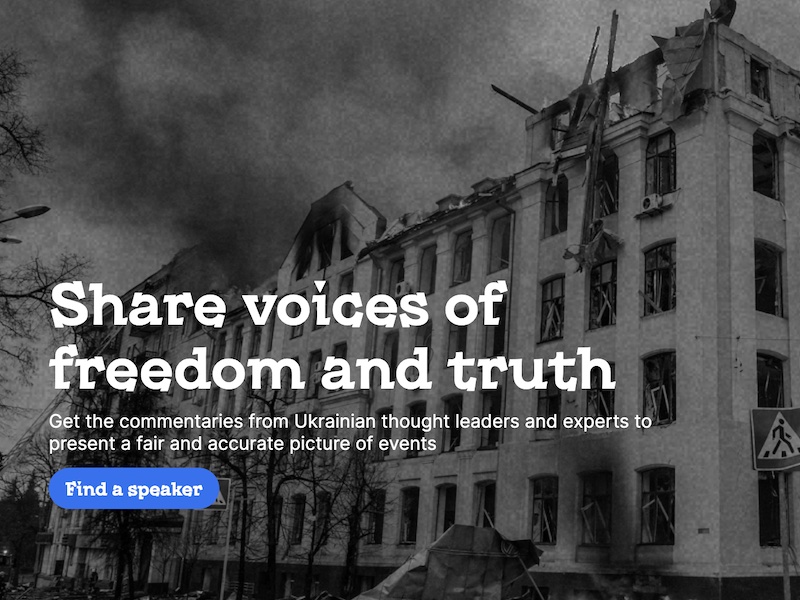Maja Pawinska Sims 31 Mar 2023 // 4:47PM GMT

KIEV — The Ukrainian PR Army, a non-profit organisation set up by PR and communications professionals in Ukraine after Russia’s invasion over a year ago, has stepped up its efforts to fight Russian disinformation with the launch of a new platform to connect journalists and communications professionals with trusted spokespeople, opinion leaders and witnesses.
The Voices of Freedom online platform allows journalists and communicators seeking comment and insight from Ukraine to search a database of more than 80 verified speakers on topics such as energy, security, ecology, food crisis, sanctions, nuclear threat, European integration, Ukrainian culture and history and unlawful deportation.
In addition, the platform allows users to check whether potential spokespeople – from politicians to bloggers – are qualified to comment as experts, of it they have previously made inaccurate statements or used the language of Russian disinformation narratives.
Over the past 13 months, the PR Army has built a network of international journalists, experts, PR specialists and volunteers and worked with more than 1,200 publications in 74 countries, including Forbes, the Washington Post, the BBC, CNN and the Financial Times. The organisation aims to tackle Russian disinformation and propaganda through its use of technology, as well as promoting Ukrainian voices globally by providing contacts and organising media interviews and comments.
Co-founder Julia Petryk said: “First of all, Voices of Freedom is a tool that ensures access to truthful and reliable information given by verified sources that will help counter manipulations and fakes. The launch of such a tool raises a question of ethics and updating the standards of modern journalism to withstand challenges caused by the Russian war against Ukraine and its ominous propaganda. With the Voices of Freedom platform comms professionals can apply a Ukrainian expert on a number of relevant topics where the experts are savvy and knowledgeable.”
Petryk said the PR Army would welcome offers of support for the initiative from the international PR community: “We are dealing with an enormous enemy and we are desperately looking for help and support from the professional community, from advocating for our expertise at PR Army to fundraising activities.”
At an event to launch the platform, LetsData, a PR Army partner, shared the outcome of a year-long investigation of Russian disinformation campaigns. Ksenia Illuk, chief analyst at LetsData, said: “Our analysis of the discourse around Ukraine from more than 5,000 digital media and 60,000 publications in 36 countries shows at least 20% of publications writing about Ukraine have Kremlin-controlled media as a source of information, either as a primary source or one of sources.
“This includes Russia Today as well as other sites that are controlled by the Kremlin and are nothing to do with real journalism, with a track record of sharing genocidal rhetoric against Ukrainians, including proxy websites for sharing Russian propaganda across Europe and the world. By citing them, we are legitimising them as a source of information, bringing pro-Russian rhetoric into discourse, and amplifying Russia propaganda.”
The event also featured a discussion on the need for responsible, ethical, and reliable media coverage of the war against Ukraine. Gulliver Cragg, a correspondent for France 24 in Ukraine since 2013, said: “Being objective does not mean being neutral. We are not neutral in this war: according to our charter, Russia is in violation of international war and human rights legislation. Using phrases like pro-Russia rather than Russian-controlled, even in journalistic communities that are not pro-Russian, builds up the idea that there is some kind of pro-Russian movement.
“You can be affected by prevailing narratives even when you know which side you are on. We have to be strenuously objective – that means being pedantic about not tolerating errors and untruths stated by any officials anywhere, including in Ukraine. When encountering Russian narratives, it’s important to be precise and not leave ourselves open to accusations of pro-Ukraine propaganda. The stakes are high – there is a danger that your report could get used as part of the information war.”



































.jpg)

















